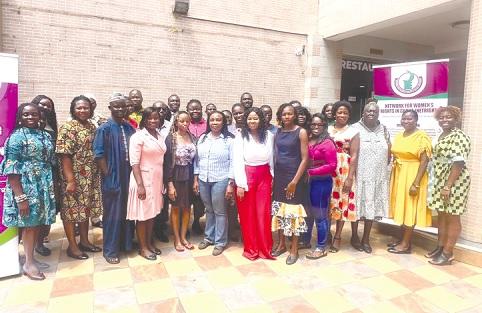
By Rebecca Quaicoe Duho
Thirty Civil Society Organisations (CSOs) have been trained on a national advocacy toolkit to make Unpaid Care Work (UCW) more rewarding in the country.
The training was facilitated by the Network for Women’s Rights (NETRIGHT) in partnership with the Alinea International and other partners, which is implementing a project titled United for Care Sensitive Approaches to Rights and Empowerment (UCARE).
The project aims at reducing the unequal and unfair burden of unpaid care work on women and adolescent girls in northern Ghana.
A Gender Consultant, Bernice Sam, said the National Advocacy Toolkit had been developed to strengthen the capacity of civil society actors to engage policymakers and duty bearers on the issue of UCW and time poverty.
She explained that unpaid care involved direct and indirect care and domestic tasks without pay to support the well-being of households and communities. This includes childcare, elder and sick care, cooking, cleaning, shopping and fetching water and fuel.
She said in Ghana, women disproportionately bear the burden of UCW, such as childcare, housework and caring for the sick and elderly, which contributes to time poverty and hinders their economic empowerment.
This unequal distribution of care responsibilities, she added, restricted women's access to education, employment and political and social participation, while also negatively impacting their health and well-being.
Patriarchy
She said the UCW of women was fueled by patriarchy, which prescribed rigid gender roles where men were expected to be breadwinners, while women were expected to take on caregiving and household responsibilities.
This socialisation, she said, meant that UCW such as cooking, cleaning, caring for children, the elderly, and the sick, was seen as “women’s natural duty” rather than a shared responsibility.
These patriarchal attitudes, she said, often devalued UCW, considering it “non-productive” because it did not generate direct income, saying that even where women participate in the labour market, patriarchal norms often push them into informal, low-paying or flexible jobs that allowed them to manage unpaid care responsibilities, reinforcing cycles of poverty and inequality.
She said the advocacy toolkit aimed to ensure that UCW was adequately recognised, rewarded or remunerated, redistributed, reduced, reclaimed and resilient.
To help lessen the caregiving burden on women and girls, both individually and within households, she called for promoting shared responsibility at the household level and encouraging education for girls and boys.
At the community level, she called for the elimination of discriminatory social norms and gender stereotypes, the modification of traditional practices that exclude women from productive work, the encouragement of positive masculinities, and the strengthening of family and community support systems during times of illness, divorce or death.
At the institutional level, she urged employers to provide paternity leave so men can support their wives after childbirth, regulate employment practices in the informal sector through collaboration with the Trades Union Congress and other trade associations to develop guidelines for employer-employee relations, implement flexible work arrangements and increase women’s representation in decision-making.
At the state or policy level, she called for the enactment and implementation of care-friendly laws and policies, the development of culturally relevant educational programmes, the production and marketing of labour-saving devices, addressing the rising costs of clean energy and investing in public services and infrastructure such as water, electricity and roads.
She also called for expanding women’s employment opportunities and programmes and addressing food and water shortages in communities.
Invest
A Programme Manager, NETRIGHT, Cynthia Sunu, in her opening remarks, said that despite the country’s commitment to gender equality through frameworks such as the Convention on the Elimination of All Forms of Discrimination Against Women (CEDAW) and the Sustainable Development Goals (SDGs), national policies had yet to integrate UCW into macroeconomic planning fully.
She said the International Labour Organisation’s 2023 Resolution on Decent Work and the Care Economy, which Ghana ratified, called on governments to recognise care work as central to sustainable development and to invest in infrastructure and policies that support caregivers.
A representative from Alinea International, Lydia Dogee, said in a remark that although Ghana had implemented various initiatives to reduce gender inequalities, many of these efforts tend to be generalised and fail to address the nuanced realities faced by different groups of women.
- Log in to post comments